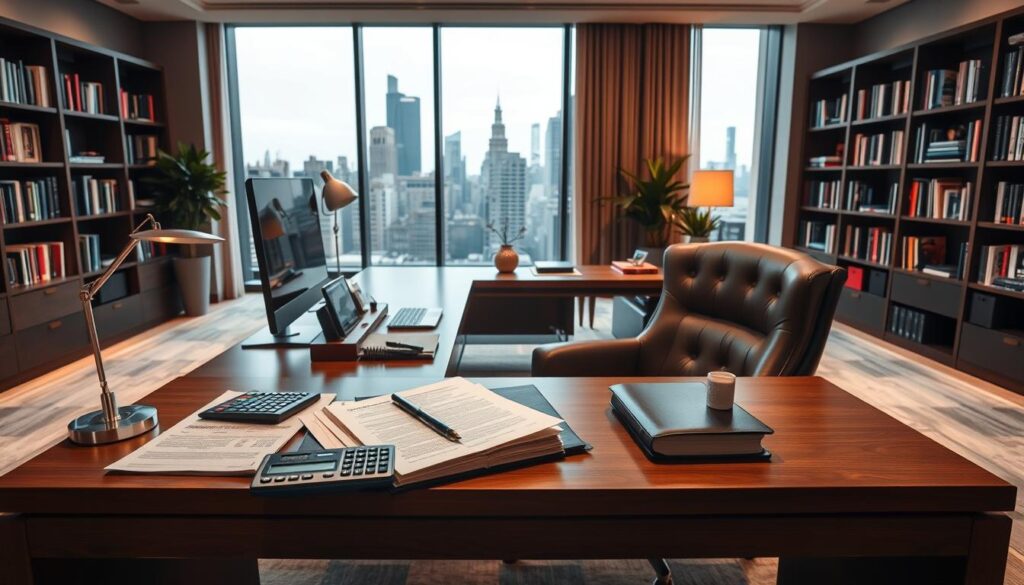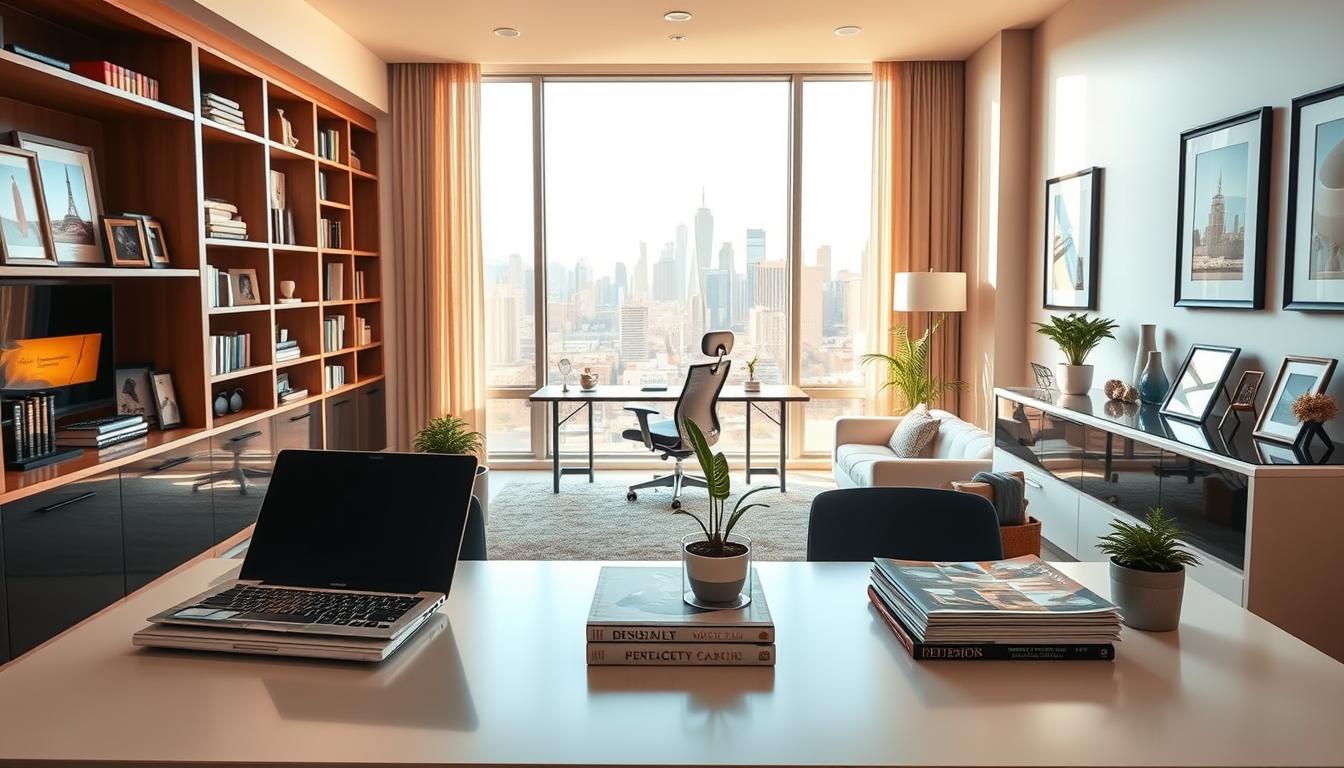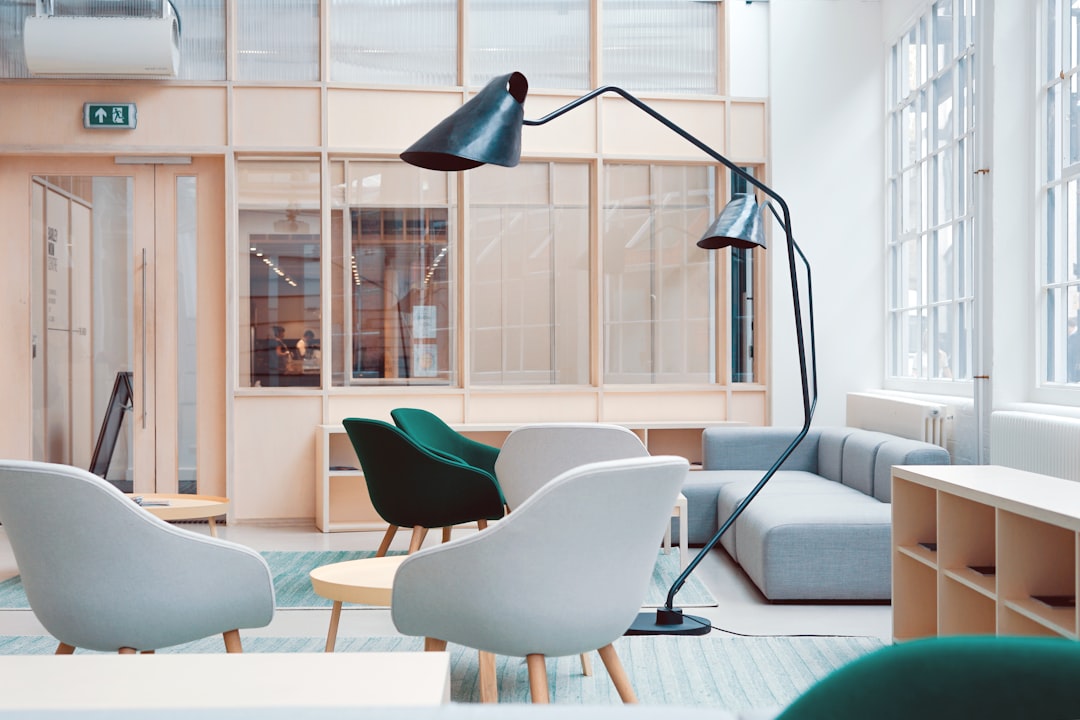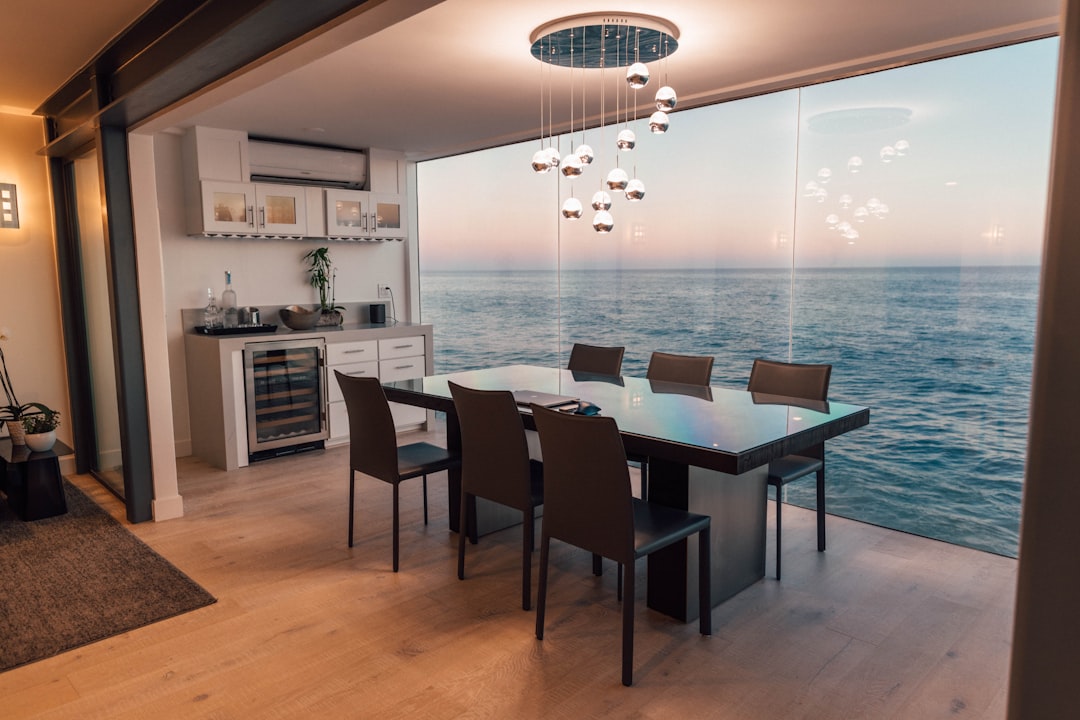The median annual salary for interior designers in the US is about $56,040. This amount can change a lot based on experience, location, and other factors. For example, new designers with less than three years of experience make around $40,000 to $50,000 a year.
Mid-level designers with 3-7 years of experience earn $55,000 to $75,000 a year. Experienced designers can make $80,000 to over $100,000 a year.
We will look into these differences and more. We aim to give a full view of what interior designers can earn. For more details on the average interior designer salary, check out our further resources.
Key Takeaways
- The median annual salary for interior designers in the US is $56,040.
- Salaries vary by experience: $40,000-$50,000 for entry-level, $55,000-$75,000 for mid-level, and $80,000-$100,000+ for experienced designers.
- Location significantly impacts salary, with states like California and New York offering higher ranges.
- Related professions have different median salaries: architects ($80,750), graphic designers ($55,000), landscape architects ($73,160), and fine artists ($49,120).
- Understanding these figures can help aspiring designers plan their careers.
Overview of Interior Design as a Career
Interior design is a field that blends beauty with function. We’ll look into what interior designers do and what skills they need to succeed.
What Does an Interior Designer Do?
Interior designers make spaces that are both beautiful and useful. They create design ideas, pick materials, and make sure their designs are done right. They need to know about color, space, and building rules.
A famous interior designer says, “The secret to great design is knowing what the client wants and adding your own touch.”
“The best interior designers have a keen eye for detail and a deep understanding of how people interact with their environments.”
Interior designers work on many projects, like homes, offices, and public areas. Their jobs include:
- Talking to clients to learn what they want
- Coming up with design ideas and sharing them
- Picking out materials, furniture, and fixtures
- Watching the design go up and making sure it’s done right
Essential Skills for Interior Designers
To be great at interior design, you need creativity, technical know-how, and people skills. Creativity is key for making new and useful designs. Communication skills are also important to share ideas with clients and builders. Plus, project management skills help keep projects on track and on budget.
Some important skills for interior designers are:
- Creativity and attention to detail
- Strong communication and people skills
- Knowledge of building codes, safety rules, and green practices
- Being good with design software like AutoCAD and SketchUp
With these skills, interior designers can make spaces that are both beautiful and practical.
Average Salary of Interior Designers in the US
Knowing the average salary of interior designers in the US is key for both new and seasoned designers. The field offers a wide range of pay levels. This is due to various factors like experience and location.
National Salary Statistics
The average annual salary for interior designers in the US is a key indicator of the industry’s health. Recent data shows the national average salary is about $60,000. But, this can change based on location, experience, and industry.
Salary ranges can be quite different. Some designers earn as little as $30,000, while others make over $100,000. The median salary gives a better idea of what most designers can expect.
“The salary for interior designers can vary widely depending on the specific sector, with residential designers often earning differently than those in commercial or healthcare design.” –
Salary Differences by Experience Level
Experience greatly affects an interior designer’s salary. Entry-level positions start at about $40,000. This is because these designers are just starting and don’t have much experience yet.
- Entry-level (0-3 years of experience): $40,000 – $50,000 per year
- Mid-level (4-7 years of experience): $55,000 – $75,000 per year
- Senior-level (8+ years of experience): $80,000 – $100,000+ per year
As designers gain more experience, their pay goes up. Senior designers or those who run their own firms can earn more. This is because they have more expertise and value to offer clients.
Factors Influencing Interior Designer Salaries
Many things affect how much interior designers make in the US. Knowing these factors helps both new and experienced designers plan their careers better.
Education and Qualifications
The education and qualifications of an interior designer greatly impact their salary. Those with a bachelor’s degree or higher and NCIDQ certification usually earn more.
The US Bureau of Labor Statistics says a degree is a big plus. NCIDQ certification can lead to better-paying jobs.
“Certification is key. It not only shows you’re an expert but also shows you’re serious about your work.” –
Location and Market Trends
Where you work also affects your salary. Big cities like New York or San Francisco pay more than smaller towns. Interior designers in these cities make more money.
| City | Average Salary | Hourly Rate |
|---|---|---|
| New York, NY | $65,000 | $31.25 |
| San Francisco, CA | $70,000 | $33.65 |
| Chicago, IL | $55,000 | $26.44 |
Specializations within Interior Design
Choosing a specialty can also raise your salary. For example, those in luxury, sustainable, or healthcare design earn more. This is because they have unique skills and knowledge.
Understanding these factors helps designers make better career choices. They can improve their earnings through education, moving to a better location, or specializing in a niche.
Interior Designer Salaries by State
The state you work in greatly affects your interior design job salary. The cost of living, demand for interior design, and local economy all play a part. These factors lead to different salaries in various states.
We looked at data from different sources to find out which states pay interior designers the most. We also found out which states pay the least. Knowing these differences can help aspiring interior designers choose the right path for their careers.
High-Paying States for Interior Designers
Some states offer interior designers much higher salaries than the national average. These states often have a strong construction industry and a high cost of living. They also have a robust economy.
- California: Known for its high cost of living and booming construction industry, California offers some of the highest salaries for interior designers.
- New York: With its dense population and high demand for luxury interior design services, New York is another state where interior designers can command high salaries.
- Massachusetts: The presence of a strong economy and a high concentration of design firms in Massachusetts contributes to its high average salary for interior designers.
Other states like Washington, Oregon, and New Jersey also offer high salaries. These states have a strong economy, high demand for design services, and a relatively high cost of living.
States with the Lowest Average Salaries
On the other end, some states have lower average salaries for interior designers. These states might have a lower cost of living, less demand for interior design, or economic challenges.
- Mississippi: With a lower cost of living and less demand for high-end interior design services, Mississippi tends to have lower average salaries.
- Arkansas: Similar to Mississippi, Arkansas has a lower cost of living and less demand for luxury interior design, contributing to lower salaries.
- West Virginia: Economic factors and a lower demand for interior design services result in lower average salaries in West Virginia.
Interior designers should consider these regional differences when planning their careers. Salary is just one factor, but knowing the local market can help designers make better decisions about where to work and how to negotiate their salaries.
Salary Comparison: Interior Designers vs. Related Professions
Knowing how much interior designers make compared to others in the field is key. It helps those thinking about a career in design make smart choices. It also gives current designers a way to see how their salaries stack up.
Interior Designers vs. Architects
Architects and interior designers work together but have different jobs. Architects design buildings’ exteriors and structures. Interior designers focus on the inside spaces. In May 2020, architects made a median of $80,750, while interior designers made $56,040.
Education plays a big role in salary differences. Architects need a professional degree, which takes five years. Interior designers usually have a bachelor’s degree, which takes four years. Architects also handle more project responsibilities, like following building codes.
Interior Designers vs. Graphic Designers
Graphic designers make visual elements like logos and graphics. In May 2020, they made a median of $53,800. Interior designers and graphic designers both need design skills and creativity.
Interior designers often work on-site, while graphic designers work in offices. The work environment and demands can affect salaries.
| Profession | Median Annual Salary (2020) | Typical Education Requirement |
|---|---|---|
| Interior Designers | $56,040 | Bachelor’s Degree |
| Architects | $80,750 | Professional Degree in Architecture |
| Graphic Designers | $53,800 | Bachelor’s Degree |
By looking at salaries of interior designers and others, we learn about the design industry’s pay. This info helps both current and future designers plan their careers better.
The Impact of Freelance Work on Earnings
More interior designers are now freelancing, thanks to the gig economy. This change brings both good and bad for their earnings. It’s a big shift that can really affect how much they make.
Pros and Cons of Freelancing
Freelancing lets designers pick their projects and clients, which can lead to better pay. But, it also means they face ups and downs in income. They have to find new clients and handle their own business costs.
The good sides of freelancing are:
- Flexibility in scheduling and project selection
- Potential for higher earnings based on project scope and client budget
- Autonomy in business decisions
The not-so-good sides are:
- Uncertainty and irregularity of income
- Need to handle business and financial management tasks
- Continuous marketing to attract new clients
Average Income for Freelance Interior Designers
The average income for freelance interior designers varies a lot. It depends on where they are, how much experience they have, and the projects they do.
| Experience Level | Average Hourly Rate | Average Annual Income |
|---|---|---|
| Entry-Level | $25-$40 | $40,000-$60,000 |
| Mid-Level | $50-$75 | $80,000-$120,000 |
| Senior-Level | $100-$150 | $150,000-$250,000 |
Freelance interior designers also need to think about costs like marketing, software, and insurance. These add up and affect their real earnings.
Job Outlook for Interior Designers
For those thinking about a career in interior design, knowing the job outlook is key. The demand for interior designers changes due to the economy, new tech, and what people want.
Projected Job Growth Rates
The Bureau of Labor Statistics (BLS) says interior designer jobs will grow 4% from 2020 to 2030. This is as fast as the average for all jobs. The reason is the need for designs that are both green and efficient in many fields.
More people want designs that are good for the planet and look great. Also, new design tech is helping a lot.
Industries Seeking Interior Designers
Interior designers are wanted in many fields, like:
- Residential design, where people want homes that feel just right.
- Commercial design, like offices and shops, that need to look good and work well.
- Hospitality design, for places like hotels and restaurants, aiming to be welcoming and unique.
These areas offer lots of chances for designers to show their talent and creativity. This makes the job outlook look good.
Benefits and Perks of Interior Design Jobs
Interior design jobs are more than just a paycheck. They come with many benefits and perks that make the job rewarding. These advantages make a career in interior design a great choice.
Health Benefits and Retirement Plans
Many interior design firms give their employees health benefits. This includes medical, dental, and vision insurance. These benefits help keep a good balance between work and personal life.
Some employers also offer retirement plans. This can be a 401(k) or pension plan. These plans help designers plan for their future.
The table below shows common health benefits and retirement plans for interior designers:
| Benefit Type | Description | Percentage of Employers Offering |
|---|---|---|
| Medical Insurance | Coverage for medical expenses | 85% |
| Dental Insurance | Coverage for dental care | 75% |
| Vision Insurance | Coverage for eye care and glasses | 70% |
| 401(k) or Pension Plans | Retirement savings plans | 60% |
Opportunities for Advancement and Growth
Interior design offers many chances for growth and advancement. With time, designers can become leaders, start their own firms, or focus on specific areas like sustainable design.
Key areas for advancement include:
- Specializing in a niche area of interior design
- Taking on leadership roles within a firm
- Starting one’s own interior design business
- Pursuing continuing education and certifications
As the need for skilled interior designers grows, so do the chances for career growth. This can lead to higher earnings, impacting the average pay for interior designers.
Salary Negotiation Tips for Interior Designers
Negotiating your salary as an interior designer needs a smart plan. You want to make sure you get paid fairly for your skills and experience. Knowing the interior design salary range is key to getting a good deal.

Preparing for Salary Discussions
Getting ready is crucial for salary talks. First, look up the average interior designer salary in your area. Consider location, experience, and industry. Use online tools like the Bureau of Labor Statistics or interior design groups for salary info.
Also, make a strong case for your salary. List your achievements, skills, and qualifications. This will help you talk confidently about your value during salary talks.
Effective Negotiation Strategies
Being confident and assertive is key in salary talks. Here are some tips:
- Know your worth and be ready to share it.
- Research the market to know the average salary.
- Be confident but polite during talks.
- Think about benefits and perks, not just salary.
- Be ready to negotiate and find a deal that works for both sides.
As
“The way you negotiate your salary sets the tone for your entire career. It’s not just about the money; it’s about being respected for your skills and experience.”
This quote shows how important negotiation is. It’s not just for the money, but also for respect in your field.
By using these tips and knowing the interior design salary range, you can negotiate well. This will help you grow in your career as an interior designer.
Real-Life Examples of Interior Designer Salaries
To understand what interior designers can earn, let’s look at some real-life examples. We can learn a lot from successful designers. They show us what affects their salaries.
Case Study: Successful Interior Designer Earnings
A top interior designer in New York City has been in the business for over 10 years. She talks about her salary. With a great portfolio and clients from high-end homes and offices, she makes $120,000 a year.
Her success comes from focusing on luxury design, networking well, and staying updated on trends. This shows how specialization and professional growth can lead to higher pay.
| Experience Level | Average Salary | Hourly Rate |
|---|---|---|
| Entry-Level (0-3 years) | $40,000 – $60,000 | $20 – $30 |
| Mid-Level (4-7 years) | $60,000 – $90,000 | $30 – $45 |
| Senior-Level (8+ years) | $90,000 – $120,000+ | $45 – $60+ |
Testimonials from Industry Professionals
We talked to several professionals in the field. Emily Chen, a senior designer, says, “A high salary comes from a strong reputation and keeping your skills sharp.”
David Lee, who runs his own design firm, adds, “Freelancing can pay well, but you need to work hard to find clients. My rates are $75 to $150 an hour, based on the project.”
These stories highlight the value of reputation, skill, and marketing in earning more in interior design.
Conclusion: Navigating Your Interior Design Career Path
Understanding interior design job salaries is key for those entering this field. Salaries for interior designers vary a lot. This depends on location, experience, and specialization.
Salary Expectations and Career Growth
When thinking about interior designer salaries, look at national averages and state data. Also, consider how freelance work affects earnings. This knowledge helps aspiring designers plan their careers well.
To earn more, interior designers should improve their skills and get relevant certifications. They should also keep up with industry trends. Whether you’re new or looking to grow, the field offers many chances for advancement.



